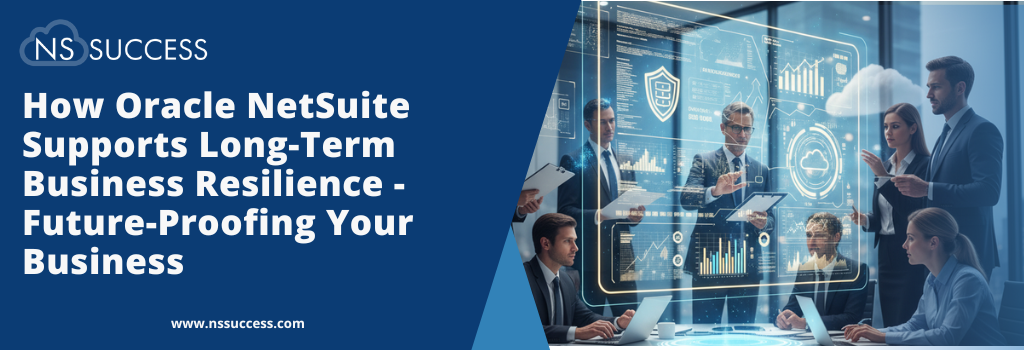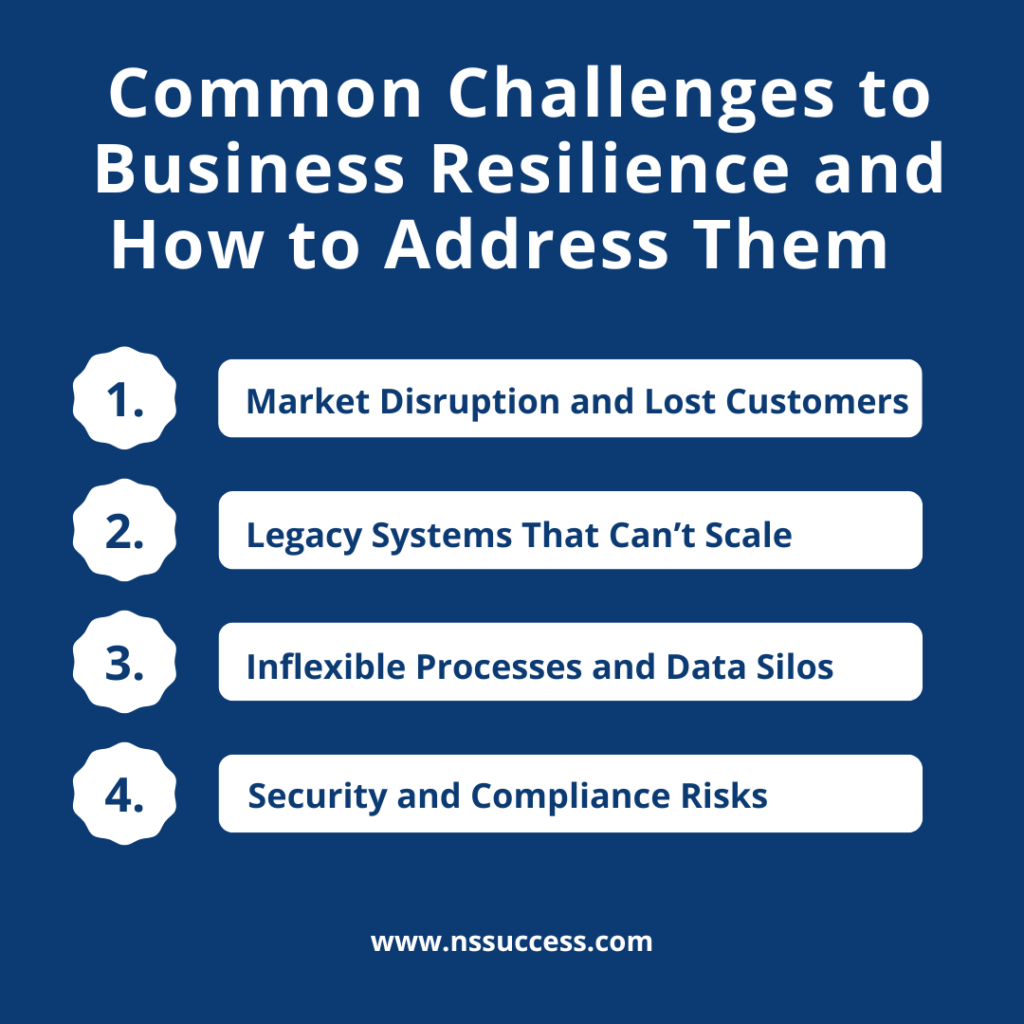
Today’s business world is more unpredictable than ever. Market conditions change overnight, new competitors emerge from unexpected places, and regulations evolve faster than many companies can adapt. On top of that, digital transformation continues to disrupt traditional business models, forcing organizations to rethink their operations, strategies, and technologies.
In this environment, “future-proofing” your business is not just a buzzword — it’s a survival strategy. It means being ready for the unknown, staying adaptable, and building systems that can handle whatever tomorrow brings. Businesses that can pivot quickly, manage change efficiently, and continue operating smoothly under pressure are the ones that thrive.
This is where Oracle NetSuite ERP steps in. As a comprehensive cloud-based ERP platform, NetSuite equips organizations with the tools to stay resilient, agile, and competitive. It integrates all key business functions — finance, operations, procurement, analytics, and more — into one unified system designed to support long-term growth.
In this article, we’ll explore:
- What future-proofing really means in a business context.
- Common challenges to business resilience and how to overcome them.
- How Oracle NetSuite’s capabilities help organizations adapt and grow.
- A step-by-step roadmap to build your future-proof ERP strategy.
- Real-world signs that your company needs a resilient ERP solution.
- Why partnering with experts like NSsuccess ensures lasting success.
What Does “Future-Proofing” Your Business Actually Mean?
Understanding the Concept
“Future-proofing” your business means preparing for change before it happens. It’s about designing your systems, processes, and culture to absorb shocks — whether they’re economic downturns, market disruptions, or new regulatory demands.
In a business sense, future-proofing means anticipating challenges and building flexibility into every aspect of your organization. It’s not about predicting the future — it’s about ensuring your company can adapt to any future that arrives.
Why Future-Proofing Matters Now
Uncertainty is the new normal. Companies face economic volatility, competitive pressure, and constant shifts in customer expectations. The ability to adapt quickly can determine whether a business survives or fades away. Future-proofing ensures:
- Operational continuity during disruption.
- Faster decision-making through real-time data.
- Sustainable growth, even during market shifts.
Three Pillars of Future-Proofing
- Financial Resilience – Maintaining stable cash flow, accurate forecasting, and the ability to make informed financial decisions in uncertain times.
- Process Resilience – Streamlining workflows and reducing dependencies on manual systems to ensure continuity.
- Technology Resilience – Using adaptable, scalable, and secure digital platforms that evolve with your business needs.
Common Challenges to Business Resilience and How to Address Them
Even successful organizations face hurdles that prevent them from becoming truly resilient. Here are some common challenges and how modern ERP solutions like NetSuite address them:

1. Market Disruption and Lost Customers
New players, pricing pressures, or shifting customer expectations can impact revenue streams. Businesses stuck in rigid systems struggle to respond quickly.
NetSuite’s Answer: With real-time analytics and centralised data, businesses can detect market trends early and adjust strategies — whether it’s refining pricing, launching new products, or entering new markets.
2. Legacy Systems That Can’t Scale
Older, on-premises ERP or disconnected tools often lack scalability. When growth accelerates, these systems slow down operations.
NetSuite’s Answer: A fully cloud-based ERP allows organizations to scale seamlessly — adding users, business units, or geographies without costly infrastructure upgrades.
3. Inflexible Processes and Data Silos
Departments working in isolation create inefficiencies and delayed decisions. Without integrated systems, leaders don’t have a single view of business performance.
NetSuite’s Answer: By unifying finance, operations, supply chain, and HR under one platform, NetSuite removes data silos and enables cross-functional collaboration.
4. Security and Compliance Risks
With increasing cyber threats and evolving data regulations, weak systems expose businesses to downtime and reputational loss.
NetSuite’s Answer: NetSuite offers enterprise-grade security, compliance support, and automatic updates to protect data and ensure regulatory alignment.
How NetSuite Supports Long-Term Resilience — Key Capabilities
A Comprehensive Unified Solution
NetSuite combines all critical business operations — from financial planning and procurement to budgeting and supply chain management — into one integrated system.
Benefits:
- No need for multiple disconnected applications.
- A single source of truth for financial and operational data.
- Reduced technical debt and maintenance costs.
This unified approach enhances organizational resilience by providing transparency and agility. Businesses can make quick adjustments based on accurate, up-to-date information.
Seamless Integration and Extensibility
Every business evolves — adding new products, entering new markets, or restructuring operations. NetSuite’s flexible architecture supports these changes with built-in integration tools and customization capabilities.
Why It Matters:
When your business pivots, your ERP must pivot with you. NetSuite easily connects with CRM systems, e-commerce platforms, HR tools, and more — ensuring a consistent flow of data.
Example:
A manufacturing company expanding into digital commerce can integrate NetSuite with an eCommerce platform to track online orders, manage inventory, and update financials automatically.
Scalability and Cloud-Native Architecture
As a cloud-based ERP, NetSuite eliminates hardware costs, manual updates, and licensing barriers. You can add users, subsidiaries, or functionalities instantly as the organization grows.
Key Advantages:
- Accessible anywhere, anytime.
- Automatic updates and patches.
- Cost-efficient scalability.
This scalability is crucial for future growth, ensuring that your ERP doesn’t become a bottleneck as your business expands globally.
Real-Time Data and Analytics
Data-driven decisions are central to resilience. NetSuite offers real-time dashboards, KPIs, and forecasting tools to give executives visibility across all departments.
Use Cases:
- Monitor cash flow and profitability in real time.
- Forecast inventory and supply chain disruptions.
- Respond quickly to emerging customer demands.
When leadership has access to accurate insights, the organization can act decisively and strategically, even during uncertain times.
Robust Security and Compliance
Cybersecurity is now a top concern for all enterprises. NetSuite delivers multiple layers of protection, including encryption, access control, and audit trails.
Key Security Features:
- Multi-factor authentication (MFA).
- Automatic data backups and recovery.
- Continuous monitoring and patching.
Compliance is also simplified with support for global accounting standards and regulatory frameworks, reducing risk and ensuring trust. In short, security equals resilience — and NetSuite makes that possible.
Building Your Future-Proof ERP Strategy with NetSuite
Conduct a Readiness Assessment
Before implementing NetSuite, evaluate your current processes, systems, and data maturity. Identify areas that create bottlenecks or inefficiencies, such as:
- Outdated legacy tools
- Manual reporting and reconciliation
- Fragmented data sources
Mapping these gaps against NetSuite’s capabilities helps design a focused transformation plan.
Define Your Long-Term Vision & Roadmap
Future-proofing isn’t about short-term gains. It’s about aligning your ERP with your strategic goals — whether that’s global expansion, digital commerce, or new service models.
Define what your business should look like in 3–5 years and choose NetSuite modules that support that vision. A phased implementation helps manage risk and ensures adaptability as your goals evolve.
Ensure Data Management & Clean-Up
Data is the fuel of a modern ERP. Before migrating, focus on cleaning and structuring your data. Remove duplicates, standardise formats, and validate accuracy.
High-quality data improves analytics, forecasting, and decision-making — enabling smarter, faster responses to future challenges.
Secure Executive Buy-in & Organizational Change Readiness
ERP transformation is not just about technology — it’s also about people and processes. Executives must champion the change, while employees should understand how it benefits them.
Tips for Change Management:
- Communicate the “why” behind transformation.
- Provide hands-on training for NetSuite modules.
- Celebrate small wins to maintain momentum.
A culture of adaptability ensures long-term adoption and resilience.
Leverage Built-In Best Practices & Configure Smartly
NetSuite provides pre-configured industry best practices to help organizations set up efficiently. However, every company has unique needs — balance standardisation with smart customization.
Too much customization can reduce flexibility; too little can limit efficiency. The goal is a system that fits your business while remaining agile for future evolution.
Monitor, Iterate and Expand
Future-proofing is an ongoing journey, not a one-time project. Once NetSuite is live:
- Use dashboards and KPIs to monitor performance.
- Identify areas for automation and optimization.
- Gradually add new modules or capabilities as business needs change.
This continuous improvement cycle ensures that your ERP remains relevant, effective, and resilient.
Real-World Signs That Your Business Needs a Future-Proof ERP Platform
Not sure if it’s time to upgrade? Here are warning signs that your business might be outgrowing its current systems:
- Rapid growth causing system slowdowns.
- Operating across multiple entities or currencies.
- Excessive manual work in reporting and reconciliation.
- Delayed access to business insights.
- Compliance or data security concerns.
- Need for faster innovation in digital channels.
In all these cases, NetSuite provides a single, scalable, and secure platform that adapts as your business evolves — ensuring continuity, compliance, and clarity.
Why Choose a Partnered Approach to NetSuite Implementation
Implementing an ERP like NetSuite requires a mix of technical expertise, process understanding, and change management experience. That’s why many organizations choose to work with certified partners like NSsuccess – Dhruvsoft
Benefits of a Partnered Implementation:
- Strategic Assessment: Get a comprehensive evaluation of your current processes and readiness.
- Smooth Deployment: Ensure seamless migration with minimal downtime.
- Tailored Configuration: Align NetSuite modules with your unique business workflows.
- User Training: Empower teams with the skills to adopt the system effectively.
- Ongoing Optimization: Continuously enhance system performance as your business grows.
With a trusted NetSuite Implementation partner like Dhruvsoft, your ERP journey becomes smoother, faster, and more sustainable — turning NetSuite into a true enabler of resilience.
Conclusion
Future-proofing your business isn’t a one-time investment — it’s a mindset. It’s about building an organization that can anticipate change, adapt quickly, and sustain growth even in uncertain times.
Oracle NetSuite provides the foundation for that resilience. Its unified architecture, scalability, security, and real-time analytics empower businesses to operate with confidence — no matter what the future holds.
If your organization is ready to strengthen its foundation and prepare for the next decade of growth, it’s time to act.
Connect with our NetSuite specialists. We’ll help you assess your readiness, design a roadmap, and build a future-proof ERP strategy tailored to your goals.
Start today — because the best way to prepare for the future is to build it now.

 “NS Success” is the NetSuite Consulting Practice of Dhruvsoft Services Private Limited – a leading NetSuite Solution Provider Partner from India – providing services worldwide …
“NS Success” is the NetSuite Consulting Practice of Dhruvsoft Services Private Limited – a leading NetSuite Solution Provider Partner from India – providing services worldwide …